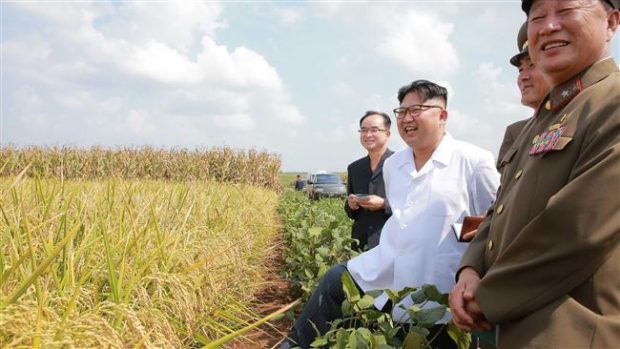Taste of strawberries
A new item in North Korean markets has recently become all the rage ― strawberries. The last two or three years have been marked by a proliferation of greenhouses, where North Korean farmers produce fruits once unheard of.
The green house industry in North Korea is private, and its emergence was largely enabled by the Kim Jong-un agricultural reforms. Now, farmers can negotiate deals with agricultural cooperatives and rent land where they can erect greenhouses.
Building such a facility is not cheap. Strawberries and melons produced there are still expensive enough to be within the reach of only the top quarter of income earners. One should remember, however, the number of people who were able to taste such delicious produce was measured in fractions of one percent, so the improvement is dramatic.
Indeed, when it comes to the economy of North Korea, much good news has emerged recently. In spite of all the talk about floods and droughts, there are no widespread shortages of food any more. Grain prices have been stable for years. There is a lot of construction going on in both Pyongyang and peripheral cities, and even in the remote countryside. North Koreans dress better than ever. At night, North Korea’s biggest cities are no longer blanketed by complete darkness ― thanks to solar panels there are lights in North Korean houses. North Korea remains the poorest nation in East Asia by a large margin but is significantly better off than it was 10 or 20 years ago.
Most, if not all of these changes are driven by the unacknowledged but powerful expansion of the private economy. It is the private entrepreneurs who cooperate with farmers to build greenhouses; it is private investors who put their money into construction projects; it is private traders who buy, sell, and transport solar panels which now dot Pyongyang apartments and countryside dwellings.
It is regrettable that American decision makers remain largely ignorant of these changes and still live in a world dominated by grossly-outdated media images of North Korea as a Stalinist dystopia on the brink of economic collapse. Perhaps had they had more opportunities to taste North Korean strawberries, they would become less sanguine about the sanctions against the regime. Indeed, it’s remarkable that actual improvements in North Korea’s economic situation roughly coincide with the introduction of stringent international sanctions that are designed to drive the economy into a corner, thus creating the necessary conditions for domestic discontent and leaving North Korea’s government no choice but to surrender their nuclear capability.
Admittedly, even had such sanctions truly succeeded in undermining the economy, they would not inspire Pyongyang to consider denuclearization. North Korea’s decision makers long ago decided that nuclear weapons constitute a vital condition for regime survival. There is little doubt that if they have to decide between giving up their nuclear weapons and ignoring the starvation deaths of countless North Korean farmers, they will sacrifice the farmers, not the bombs. Fortunately, due to the revival of the North Korean economy, such a binary decision remains theoretical. The changes of the last half decade demonstrate North Korean leaders can, in fact, have their cake and eat it too. They can allow private entrepreneurs to generate growth while enjoying advancing their nuclear and missile programs with truly remarkable speed.
All this indicates a true triumph of the market system in a place where most supporters of such a system hate it with a passion. But it also means prospects for the future are less than rosy. North Korea is going to remain nuclear. There is no chance that international sanctions, so spectacularly inefficient, will have the slightest impact on the country’s future policies.
Admittedly, developing North Korea is less likely to initiate a nuclear war. Perhaps as long as the new ruling class, now consisting of both ruthless party apparatchiks and bold entrepreneurs, stays in power, North Korea will behave more cautiously than before. After all, easier access to Porsche cars for the rulers and fresh strawberries for the masses tend to make peoples and nations less bellicose. Nonetheless, it’s an uncertain bet. It seems increasingly likely that we will have to live with a nuclear-armed, highly oppressive politically, but increasingly prosperous North Korea for years and even decades to come.

























































